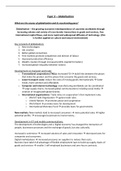Summary
Summary A level Pearson Edexcel Geography year 1 notes (Dynamic Places) Topic 3: Globalisation
- Course
- Institution
- Book
Detailed notes for revision regarding the (Dynamic Places) Topic 3: Globalisation, A level geography course. Overview: Globalisation and global interdependence continue to accelerate, resulting in changing opportunities for businesses and people. Inequalities are caused within and between countr...
[Show more]














